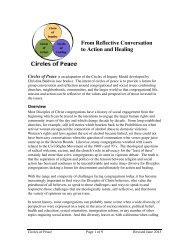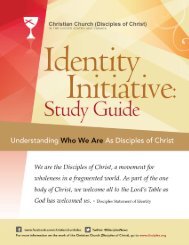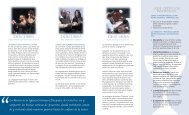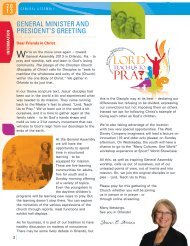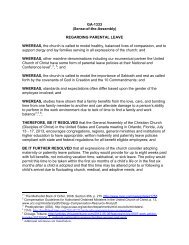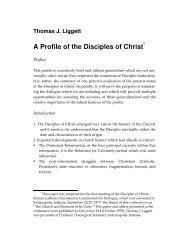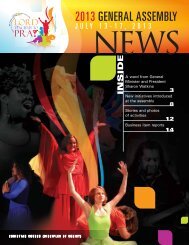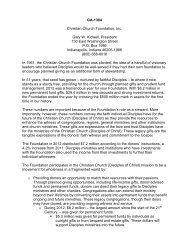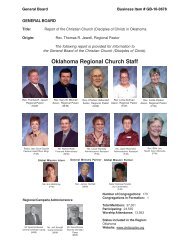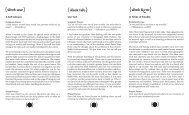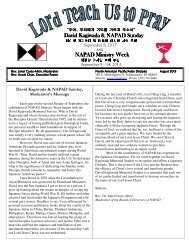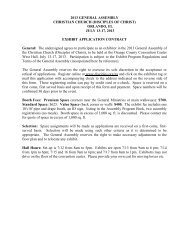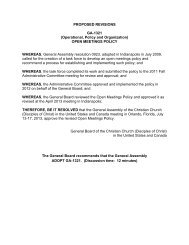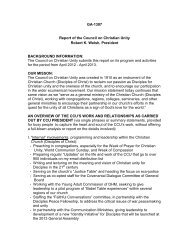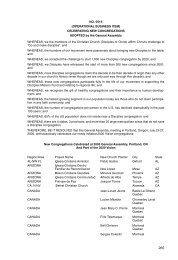RESOURCING THE CHURCH FOR ECUMENICAL MINISTRy A ...
RESOURCING THE CHURCH FOR ECUMENICAL MINISTRy A ...
RESOURCING THE CHURCH FOR ECUMENICAL MINISTRy A ...
Create successful ePaper yourself
Turn your PDF publications into a flip-book with our unique Google optimized e-Paper software.
challenges that we will explore in greater depth<br />
throughout the course of this consultation. And,<br />
please keep in mind, our task is not to lament, but<br />
to assess and respond.<br />
Diversity and Unity<br />
We live in an era (often called post-modern) when<br />
many people regard diversity as an end in itself.<br />
Surely, it is good to affirm groups and perspectives<br />
that have been historically marginalized or excluded.<br />
But it is also possible, in my judgment, to<br />
value diversity to such an extent that God’s gift of<br />
unity is undercut.<br />
Leaders in the ecumenical movement, drawing<br />
on scripture, have contended at least since 1910<br />
that unity and diversity must be held in dialectical<br />
tension in any true understanding of the church.<br />
An emphasis on unity that does not value human<br />
diversity—diversity not only of race and culture,<br />
but also of theological perspective—can easily<br />
become bland and authoritarian. But, conversely,<br />
an emphasis on diversity without concern for what<br />
Paul calls the “common good” can easily become<br />
fragmented and provincial. Unity is meaningful<br />
only if it includes in one whole those who are not<br />
alike. And diversity is only diverse when seen in<br />
relation to the other distinctive members of a<br />
whole body.<br />
During the early decades of modern ecumenism,<br />
however, the balance at times seemed to tip in the<br />
direction of unity, as if diversity were a problem to<br />
be resolved. Confessional identities, it was argued,<br />
need to die as part of the cost of union. Particular<br />
racial or ethnic groups need to be “included” (read<br />
“absorbed”) in the majority. Theological differences<br />
need to be eliminated through dialogues<br />
aimed at reaching “consensus.” It is little wonder<br />
that, when ecumenists spoke of unity, many<br />
Christians (especially by the late 1960s) heard it as a<br />
subordination of diversity based on the preferences<br />
of those with power.<br />
Over the past two generations, however, the balance<br />
has clearly shifted in the other direction—and that,<br />
too, can have destructive consequences. Churches<br />
that overvalue diversity settle for tolerant cooperation<br />
rather than struggling to overcome churchdividing<br />
issues, such as those that still prevent<br />
Christians from sharing the Lord’s Supper or<br />
recognizing one another’s ministries. Affirmation<br />
of particular identity comes to be seen as an end in<br />
itself rather than as a God-given opportunity to<br />
5<br />
share spiritual and cultural gifts in order that the<br />
body, in the words of Ephesians, may be “built up<br />
in love.”<br />
Disciples claim to be a movement for<br />
wholeness, but, in fact, our emphasis on<br />
personal freedom and individual<br />
interpretation makes this very difficult in<br />
practice.<br />
This is difficult terrain. All of us here, I trust, affirm<br />
the goal of being a “multi-cultural, inclusive<br />
church”—as long as the different cultural and racialethnic<br />
streams are seen as parts of a whole<br />
communion. To put it simply, the goal of the<br />
ecumenical movement (and, I hope, of our life as<br />
Disciples) is not to bring together those who are<br />
diverse—that is the goal of governments or political<br />
parties. The goal is to celebrate the wondrous<br />
diversity of our given oneness as children of a single<br />
Creator and members of Christ’s body.<br />
Disciples claim to be a movement for wholeness,<br />
but, in fact, our emphasis on personal freedom and<br />
individual interpretation makes this very difficult in<br />
practice. The post-modern emphasis on diversity<br />
only increases the challenge.<br />
Justice and Unity<br />
There is clearly a new focus on justice as a central<br />
theme (for many, the central theme) of the ecumenical<br />
movement. Again, this needs to be said very<br />
carefully. Speaking personally, I am entirely in favor<br />
of a strong justice emphasis. (After all, I was the<br />
chair of the NCC’s Justice and Advocacy Commission<br />
before becoming General Secretary, and<br />
am often identified among Disciples with justice<br />
causes.) The challenge, once again, is to sustain a<br />
necessary tension between justice and the calling to<br />
unity.<br />
Let me put it as bluntly and succinctly as I can.<br />
Christians acting together for justice, without<br />
concern for how this deepens and expands the life<br />
of the church, are not “ecumenical” in any full sense<br />
of the word. Just as Christians pursuing sacramental<br />
fellowship, without concern for how this deepens<br />
and expands their engagement with the world, are<br />
not “ecumenical” in any full sense of the word. For<br />
ecumenical Christians, the terms help define each<br />
other. On the one hand, talk of unity can end up<br />
Kinnamon • A Century of Witness, a Journey of Wholeness



